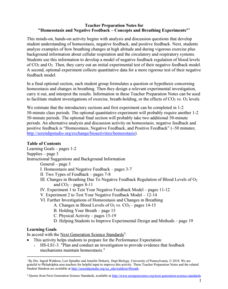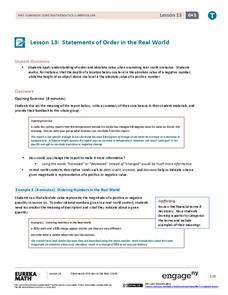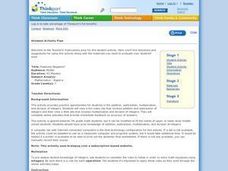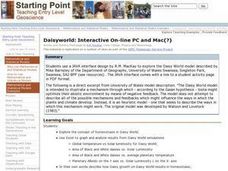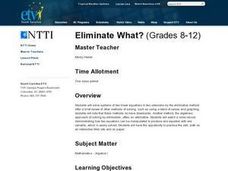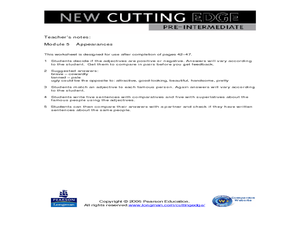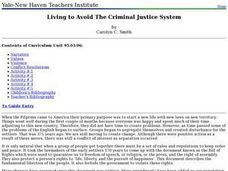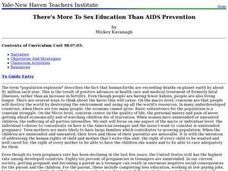Serendip
Homeostasis, Negative Feedback, and Positive Feedback
So many bodily activities depend on homeostasis! Give learners a solid background to understand the basic process of the human body. Scholars first examine negative feedback loops contributing to body temperature regulation and then a...
Serendip
Homeostasis and Negative Feedback – Concepts and Breathing Experiments
More asthma attacks happen at higher altitudes, but why? Scholars complete worksheets, learning about homeostasis and feedback related to breathing. Then, they work in small groups to experiment with breathing in limited amounts of...
EngageNY
Real-World Positive and Negative Numbers and Zero
Class members investigate how positive and negative numbers are useful in the real world. Individuals first read a short passage and identify terms indicating positive and negative numbers. They consider situations involving positive...
Curated OER
Feedback and Flowcharts
Sixth graders explain what a negative feedback system is and they distinguish it from a positive feedback system. They describe examples of how negative feedback is used in both nature and technology. , Students define homeostasis, and...
EngageNY
Statements of Order in the Real World
Positive and negative numbers are all around us. Groups read short story contexts and identify a rational number that represents the values in the context. They order the rational numbers and interpret statements of inequality.
Curated OER
Positively Negative?
Students practice the addition, subtraction, multiplication, and division of integers. They view a video clip on addition and subtraction of integers. Students observe a Web site that reviews multiplication and division of integers....
Missouri Department of Elementary
Juggling New Opportunities
Life is like trying to juggle three tennis balls! That's the big idea in a instructional activity that asks freshmen to consider that sometimes juggling the areas of their lives (social/emotion, academic, and career) runs smoothly and...
Curated OER
Daisyworld: Interactive On-line PC and Mac
Students use a JAVA interface to explore the Daisy World model to illustrate a mechanism through which - according to the Gaian hypothesis - biota might optimize their abiotic environment by means of negative feedback.
Curated OER
Beauty is More Than Skin Deep: Examining the Positive and Negative Depictions of Physical Appearance in Children's Films
Third graders compare and contrast different versions of the same story. They recognize our differences, identify qualities that make us special and unique individuals, and create a 'Wanted' poster illustrating a special quality.
Curated OER
Anger, Aggression and Adolescents
Students examine the relationship between anger, aggression and teenagers. As a class, they share a difficult situation in their own lives and review the techniques to properly deal with it. In groups, they discuss how they feel about...
Curated OER
Multicultural Issues and the Law: Gender and Race Based Schooling
Students examine the problems associated with gender based and race based education. In groups, they research the history of education and the laws that have changed education and impacted lives. They brainstorm a list of the positives...
Workforce Solutions
Actions Speak Louder Than Words
A short video demonstrates the importance of non-verbal communication in the forming of first impressions. Viewers observe the facial expressions, tone of voice, body language, and appearance of job seekers in an interview, then discuss...
EngageNY
Multiplying and Dividing Expressions with Radicals
That's radical! Simplifying radicals may not be exciting, but it is an important skill. A math lesson provides explanations of properties used throughout the material. Scholars practice skills needed to multiply and divide...
Curated OER
Reflecting on Reflectivity
Students plan and construct a "mini-lab" to measure the reflectivity of different earth surfaces. They measure reflectivity of materials, including ice, soil, rocks, etc., and then extrapolate from what they have learned to consider the...
Curated OER
Eliminate What?
Learners are introduced to the elimination method in Algebra. As a class, they solve two linear equations with two unknowns using this new method. They discuss the positive and negative aspects of using this method to solve problems. ...
Curated OER
Adjective: Appearances
In this adjective worksheet, students are given a list of adjectives and asked to complete several tasks with them. Students must determine which adjectives are negative, which are positive, match them to famous people and write...
Curated OER
Living to Avoid The Criminal Justice System
Students brainstorm a list of negative stereotypes in the African-American society. In groups, they develop ways to decrease the chance of them living in poverty and being in trouble with the law. They develop ways to solve problems...
Curated OER
There's More To Sex Education Than AIDS Prevention
Students are introduced to the views on sexuality in the United States. In groups, they research data from five countries and compare them with the United States. Using the information, they develop reasons why the teenage pregnancy...
Curated OER
Visual Communication of Quantative Data
Students collect and analyze data based on academic performance. In this statistics lesson, students create graphs and analyze the data they created. They use positive, negative and no correlation to analyze the data.
Curated OER
Sentence Writing and Parts of Speech
In this sentence writing worksheet, students are given sentences with the words out of order and must put them in order so the sentence makes sense. Students are also given adjectives and must divide them into positive and negative...
Curated OER
A Saint in the City- Sufi Arts of Urban Senegal
Students become more knowledgeable about modern-day Senegal and the significance of one charismatic Sufi leader, Amadou Bamba. They become more aware and examineing of Islam and offset any misexamineings and negative stereotypes about...
Curated OER
Controlling the Code: Molecules at Word
Students investigate how cells determine which genes will be expressed and which will be silent. In this genetics instructional activity, students use on-line resources to complete a worksheet and gather information about gene...
Curated OER
Climate Change: Carbon Cycle
Students explore the carbon cycle. In this carbon cycle lesson, students discuss the four main reservoirs where carbon is stored and then discover the process through which each reservoir absorbs and releases CO2. This lesson includes a...
National Wildlife Federation
Wherefore Art Thou, Albedo?
In the sixth lesson in a series of 21, scholars use NASA data to graph and interpret albedo seasonally and over the course of multiple years. This allows learners to compare albedo trends to changes in sea ice with connections to the...
Other popular searches
- Negative Feedback Loops
- Hormone Negative Feedback
- Negative Feedback Mechanisms
- Negative Feedback Systems
- Negative Feedback Endocrine
- Hormonal Negative Feedback

